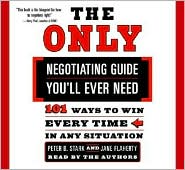Good books on negotiation are hard to find. The problem is partly me, and I'm sure the books out there have their merits for other people. I insist that negotiation be structured and taught in this way:
Finally, I've found a book that does just that:
Peter Stark and Jane Flaherty, The Only Negotiating Guide You'll Ever Need: 101 Ways to Win Every Time in Any Situation, Amazon Barnes&Noble Audio CD
Now, like you, I was put off by the title, but I found myself flicking through every every book in negotiation they had at Barnes and Noble recently, and they all had the same problem: focus on one particular aspect as the point of negotiation.
E.g., a common mistake is that negotiation is about selling. This is best seen in the popular "Getting to Yes" series, where one of the authors, William Ury, laments the failure of the sales approach to teaching negotiation in his sequel "Getting past No!"

The book above, 101 Ways, is structured as I want it, so it performs admirably as a beginner's guide.
It has a couple of flaws. It doesn't really include much discussion of how win-win is phased. As promised by its title, the book includes a long list of techniques at the back, but each is unlabelled, so the reader is left on their own to figure it out. That's a fun exercise and mildly amusing for me, but I think it would be better if the learner did a little rote absorption first, then practiced in the field. There is no need to add additional challenge.
This book is just the basics, just the intro. It's only 100 pages, only ten bucks. But because it is structured with the concepts at the beginning, and leads you through the path, you will be well-placed to then research the rest on your own.
After you have really truly absorbed the lessons of win-win and can practice it, I would suggest
Robert Greene, The 48 Laws of Power. Amazon, Barnes&Noble.This is an advanced read in how to use win-lose in long term power building. The essence is to keep the power and aggregate it, and the author lays out lots of techniques that can achieve that. Quick summary here. Most of them are win-lose, straight off, so the author is presenting a dance of never being caught out. However some of them are equally applicable and thoughtful for both sides.
The beauty of this book is that it is not really a book on negotiation at all, it is a long walk through many historical examples and classical figures of power. This makes it much easier to read and appreciate, and indeed it is relatively easy to pick up and read, one chapter at a time, it's just like reading history.
However, without a good understanding of the basics of win-win versus win-lose, you will waste time by reading this book. Because it lays out its path without an assumed understanding of why, readers will likely make mistakes and employ the tactics at the wrong time. You will see this in reviews of this book, expressions of angst about how bad the world is! Always, start with the basics. Understand the battleground before drawing swords!
Unfortunately I have not come across a good advanced book on win-win side as yet.